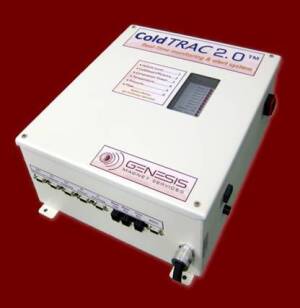by
Brendon Nafziger, DOTmed News Associate Editor | November 14, 2011

ColdTRAC 2.0 (Credit: Genesis)
A new automated alert system could help warn of MRI cryogen leaks, potentially saving imaging centers thousands of dollars on lost helium costs.
Genesis Magnet Services LLC, an MRI service firm, has launched ColdTRAC 2.0, a small monitor that attaches to an MRI and alerts up to 12 contacts, including Genesis service engineers, if it detects any abnormal readings from the machine. The Huntley, Ill.-based company says the goal is to catch and fix problems before cryogen is boiled off.
"Out of every 100 MRIs, 40 of them will have some kind of inefficiency that's causing unexpected cryogen loss," Randy Walker, vice president of sales and marketing for Genesis, told DOTmed News.



Ad Statistics
Times Displayed: 656
Times Visited: 5 Fast-moving cardiac structures have a big impact on imaging. Fujifilm’s SCENARIA View premium performance CT brings solutions to address motion in Coronary CTA while delivering unique dose saving and workflow increasing benefits.
MRI magnets use cryogens, usually liquid helium, to stay super-cold. In general, most modern magnets lose a little cryogen every year, typically less than 10 percent of their supply, Walker said. But inefficiencies in the system can cause more significant loss. Most MRIs are hooked up to a cold-water chiller, for instance. But dirty cold water filters, aging coldheads, oily absorbers or troubles with the water supply can cause the unit's pressure to increase, and therefore its temperature to rise. As a result, cryogen slowly boils off.
Another problem is power loss, especially in Texas and Florida, which are often hit yearly by hurricanes and big storms. While most hospitals have back-up generators that get tested weekly, imaging centers often do not. And once power's lost on the MRI, the coldhead can shut down. Pressure in the unit will then start to rise within 30 minutes, Walker said.
Cryogen's costs
"Quenching," the potentially catastrophic, and explosive, sudden evaporation of the helium in the MRI can be dangerous, but the more typical worry for MRI owners is the gradual loss of cryogens, Walker said.
Because of minimum purchasing costs and inefficiencies in transferring liquid helium, replacing lost cryogen costs at least $2,500 for the materials alone, Walker said.
But he said, for the ColdTRAC monitoring system, Genesis estimates the savings also come from finding general performance problems before they get out of hand.
"The earlier you catch a problem, typically, the less expensive it becomes," he said. "If I find out early that my cold water flow is down from what it should be, I can address that at the hospital level. If I allow that for any length of time, the fact it's not pulling heat away causes the compressor to overwork, which itself causes problems for the coldhead. My costs just changed again," Walker said.

